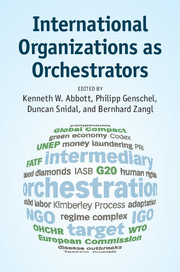Book contents
- Frontmatter
- Contents
- List of Figures
- List of Tables
- List of Contributors
- Acknowledgments
- List of Abbreviations
- Part I Introduction
- Part II Managing states
- Part III Bypassing states
- 8 WHO orchestrates?
- 9 Orchestrating peace?
- 10 Governing where focality is low
- 11 Orchestration for the “social partners” only
- 12 Orchestrating the fight against anonymous incorporation
- Part IV Implications
- References
- Index
10 - Governing where focality is low
UNEP and the Principles for Responsible Investment
Published online by Cambridge University Press: 05 April 2015
- Frontmatter
- Contents
- List of Figures
- List of Tables
- List of Contributors
- Acknowledgments
- List of Abbreviations
- Part I Introduction
- Part II Managing states
- Part III Bypassing states
- 8 WHO orchestrates?
- 9 Orchestrating peace?
- 10 Governing where focality is low
- 11 Orchestration for the “social partners” only
- 12 Orchestrating the fight against anonymous incorporation
- Part IV Implications
- References
- Index
Summary
Abstract
In this chapter, we assess the plausibility of the orchestration framework developed by Abbott et al. in relation to the orchestration activities of UNEP. Examining the PRI, which the UNEP Finance Initiative (UNEP FI) set up jointly with the UN Global Compact, we test the explanatory power of the hypotheses suggested in the framework chapter. Given that UNEP has been a prominent example in the early literature on orchestration, it is not surprising that the reality we observe fits well with many elements of orchestration theory. UNEP has limited capabilities; its member states have divergent goals on regulating the environmental performance of business through legally binding agreements; and state oversight of business engagement by the Paris-based UNEP Division on Technology, Industry and Economics (UNEP DTIE) and its Geneva-based UNEP FI Secretariat is moderate. This leaves those offices, both characterized by strong entrepreneurial cultures, with much leeway to experiment with innovative governance modes. Yet in the PRI case, focality worked very differently from the way Abbott et al. propose. UNEP engages in orchestration precisely in those areas where its focality is low, branching out into emerging policy areas to affirm its relevance as it confronts a more interconnected and crowded sustainability policy domain. Orchestration, we conclude, does not necessarily require thematic focality, but can also be used to compensate for its absence.
- Type
- Chapter
- Information
- International Organizations as Orchestrators , pp. 237 - 261Publisher: Cambridge University PressPrint publication year: 2015
- 11
- Cited by

